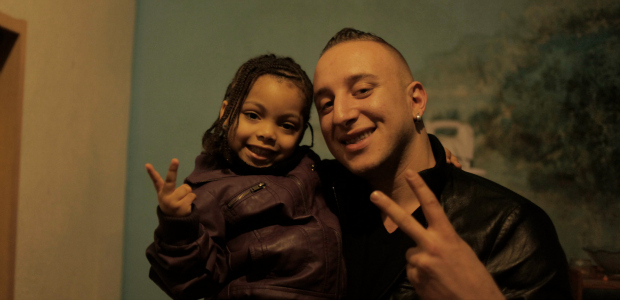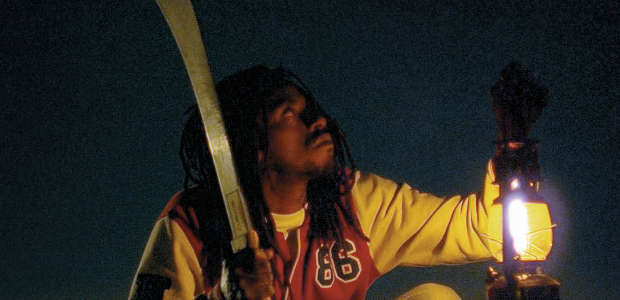Basil Da Cunha
Who Wants to Be a Millionaire?

Basil Da Cunha’s first feature, After The Night, is a unique hybrid in the bestiary of film. Set in the creole ghettos of Lisbon, it has the documentary grunge of social realism, like La Terra Trema (1948), Luchino Visconti’s glamorously grimy Italian neo-realist classic; or Life of Jesus (1997), Bruno Dumont’s unflinching excursion in youthful destruction; or last year’s The Selfish Giant (2013) by Clio Barnard with its traditional British surfeit of absence of hope. It’s like these films, only without the glitz. But After the Night is also a genre film, a favela noir, with a hapless, hopeless doomed anti-hero, Sombra, always on the hurt end of a beating, with bad debts and bad loans, his sass with woman turning into meek groveling, always in the wrong place. But there is no right place, really, in the Reboleira slum; a place of poverty, crime, disease, and degradation, the only succor is in Santeria fantasies of redemption. Yet here are also moments of ecstatic abandon as music erupts in the darkest and dirtiest corners, with improvised instruments and the sheer will to dance.
I recently asked Da Cunha about the unique quality of nothing-to-lose filmmaking, with no budget and no expectations, creating limitations, certainly, but also freedom.
‘I want to capture what was real,’ he said, ‘I don’t like the artificial.’
But, I suggested, with success comes interest—and After The Night is certainly attracting interest—and money, and as things get more funding, they get more expensive. Would that affect him as a filmmaker?
‘Those are not the films I want to do. I want to stay poor! Yes, some more money to pay the actors would be good, but I don’t need anymore. Already I’ve had people interested in doing co-productions. Not long ago, I was approached by four Germans. But the more money, the more people get involved, and interfere. I like the film to unfold naturally. I don’t need a bunch of Germans there with me. For example.’
And for After the Night, he worked with a miniscule crew.
‘I work quickly, and with a very small group of people. It’s just me, my cameraman, a sound guy. I didn’t want the usual social realist style, condescending and patronizing, looking in at these poor people in their slums—I wanted to make it from the inside out. I wanted to create the world through the eyes of people living there. Because it’s not a social issue for these people, it’s day-to-day life. I’m not interested in recreating reality, I want to capture it. We keep it loose, simple.’
The film is indeed loose. Besides the inevitable echoes of social realism, and the surprising flavor of film noir, there is also very much a punk sensibility. This is a nocturnal world and a kind of exuberant anarchy, bred of despair and anger, infuses the film. Police are a paltry presence—hearing their sirens doesn’t create tension or fear—the slum itself is far more dangerous than the cops. It’s the kind of place where people take a machete with them to the toilet, and wash out of a mucky pail. But there’s always time for fucking and dancing and singing.
Sombra is an outcast in a world of outcasts, scrambling to try and appease the local crime boss, dragged into armed robbery, double-crossed, framed, and on the lam. Escape, of course, is pointless, either geographically, economically, or religiously. He’s doomed. Sombra is played—with both nuance and possessed rage—by Pedro Ferreira; he heads a cast—like the crew—made up of Da Cunha’s friends and neighbors.
I’m surprised, I said, that there were no rehearsals. I’ve found that non-professional actors can become stiff in front of a camera, self-conscious, because they’re not used to it.
‘Professional actors complicate things,’ Da Cunha said, ‘it’s much better to work with non-professional actors. They don’t have all the problems, all the baggage. They don’t need to be babied. They don’t need to be talked to and convinced to go through a door.’

And you didn’t show your actors a script?
‘No, no script. It changes; it’s constantly changing as we are shooting. It develops naturally. I don’t want to set up scenes and plan everything that’s going to happen. I think because of that I can get something real, something authentic, because it is real. It’s happening there in front of the camera—it’s important that more things take place in front of the camera than behind. We also shot chronologically, from beginning to end, so the characters can change, and be involved in the creation of the movie, and so the story can become what it needs to be. I don’t use a script because, every day, I like to surprise my actors.’
You make it sound easy!
‘These are the stories and lives of people I know, made with people I people I know. I don’t want it to feel like work. It has to be enjoyable. Together, my cast and my crew, we create something.’
The film takes place mainly at night, a Dantean labyrinth of low light and shallow focus, and is less rough and dirty—though it is that—than mystical and magical. Sombra, stubbornly, says he will only emerge at night, even when he’s told by a neighbor that, ‘night belongs to those who’ve given up.’
Why? What did that symbolize?
‘Nighttime is time when, normally, people are not out. And when the character tells Sombra that night is for losers, that he should be out during the day, I am only writing what the people are saying. I wanted it be a separate place from where other people live, the businessmen, people with jobs. It becomes another world.’
What’s next? Working with the same team?
‘Yes, there are so many stories we have and want to tell! We’re planning a film that’s a road movie, again with people who live in the Reboleira neighborhood. You’ll see more or less all the actors from After the Night, especially three of them who will play gangsters who have to run away from the ghetto and then travel across Portugal. And then the other one we’re planning is a revenge film.’
Two new, completely different genres, both from the ghetto!
‘Yes! One a thriller, the other a comedy!’
After The Night is out in cinemas (Curzon Soho and Hackney PictureHouse) and on VoD from 25 April.









COMMENTS